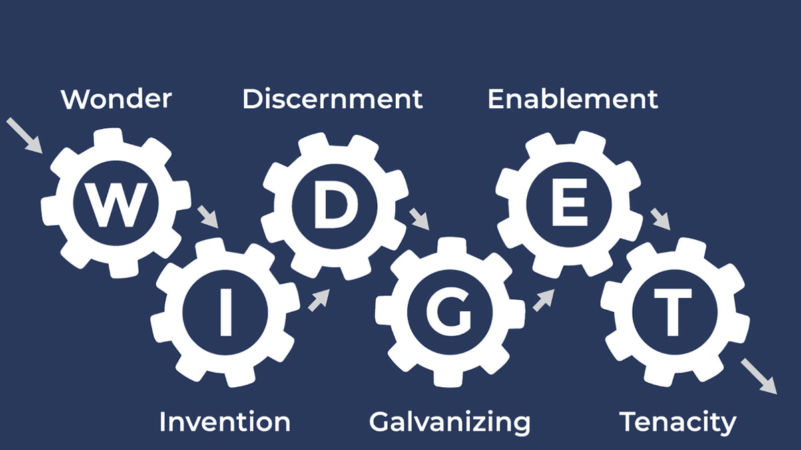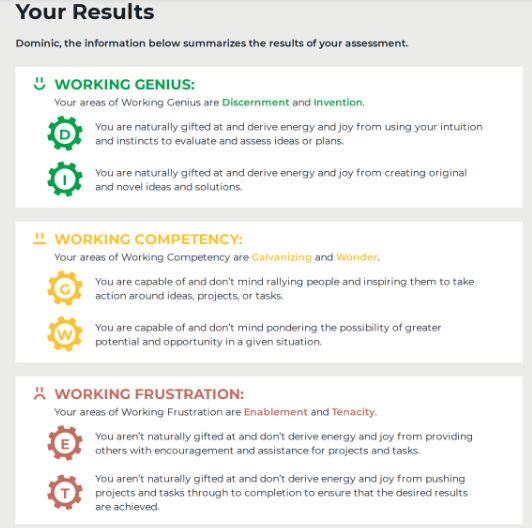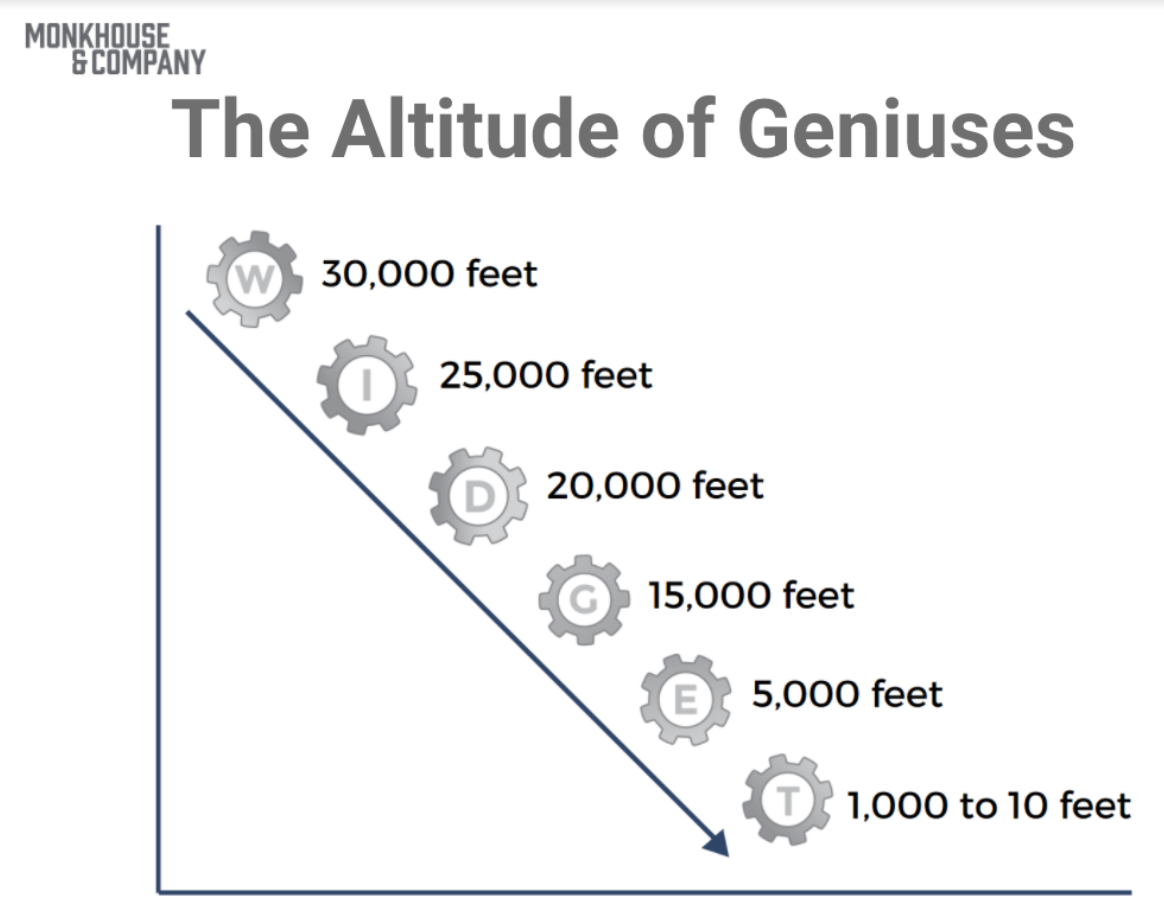Quick Summary
Patrick Lencioni’s ‘Working Genius’ model identifies six natural gifts—Wonder, Invention, Discernment, Galvanising, Enablement, and Tenacity—that enhance team productivity and collaboration.
Takeaways
- Leverage Natural Talents. Lencioni’s Working Genius model identifies six strengths that enhance team productivity and collaboration.
- Align Roles with Strengths. Assigning tasks based on individual geniuses increases efficiency and job satisfaction.
- Reduce Burnout. Recognising areas of frustration allows for better role distribution, reducing stress and improving performance.
- Drive Business Growth. Implementing the Working Genius framework creates a more cohesive, high-performing team that fuels success.
Imagine if you could tap into the natural gifts of your team to unlock productivity, foster collaboration, and make work genuinely energising. That’s what Patrick Lencioni’s Working Genius model is designed to do. It’s not just a personality tool—it’s a practical framework for discovering what energises and frustrates your team so you can achieve results faster and with less friction.
At its core, Working Genius is an energy model. It helps individuals and teams identify the tasks that put them in flow—their natural zone of productivity and joy—and avoid the frustrations that drain them. And the payoff is enormous. McKinsey found that executives in flow are 500% more productive than those who aren’t. Imagine the compounding impact if your entire team could work this way.
Here’s how Working Genius can transform your organisation, with insights from my own results and real-world applications we’ve seen with our clients.
What Is ‘Working Genius’?
Created by Patrick Lencioni and his team at the Table Group—a firm dedicated to improving organisational health—Working Genius is a tool designed to help teams work better together. It identifies six distinct types of natural gifts, or “geniuses,” that play a role in the work process. These are Wonder, Invention, Discernment, Galvanising, Enablement, and Tenacity.
Every work project—whether it’s launching a product, solving a customer problem, or driving organisational change—moves through these six phases:
- Wonder: Asking big questions and identifying opportunities for improvement.
- Invention: Creating original and novel ideas to address challenges.
- Discernment: Instinctively evaluating ideas and determining what makes sense.
- Galvanising: Motivating and rallying the team to take action.
- Enablement: Providing support needed to move projects forward.
- Tenacity: Staying focused and ensuring tasks are completed.
Each person has two areas of genius (their natural gifts that energise them), two areas of competency (tasks they can handle but don’t love), and two areas of frustration (tasks that drain their energy).
How the Working Genius Model Helped Me Understand Myself
Taking the Working Genius assessment was like holding up a mirror to my strengths and frustrations. My two geniuses are Discernment and Invention. I thrive on creating ideas and instinctively evaluating their potential. This is where I find joy—it’s what gets me out of bed in the morning.
But then there’s the flip side. My frustrations are Enablement and Tenacity. These are the tasks that leave me feeling drained. If I’m forced to focus on detailed follow-through, I lose energy and momentum.
For example, writing my book required Tenacity—not my strong suit. To succeed, I had to lock myself away, eliminate distractions, and power through. This wasn’t joyful work for me, but I made it happen by managing my environment.
The real lightbulb moment, though, was seeing how this applied to my team. My colleague Carlos, for instance, excels in Enablement and Discernment. While I love coming up with ideas, Carlos is brilliant at supporting and refining them. Recognising this dynamic has helped me stop judging others by my own strengths and focus instead on what they bring to the table.
Why Working Genius Matters for Teams
Business is a team sport, but too often, teams feel like they’re working against each other instead of with each other. The Working Genius model gives leaders a way to diagnose and fix these dynamics.
One of our clients had two teams tackling similar projects. One team was thriving, completing tasks efficiently, while the other struggled to make progress. The issue became clear when we introduced the Working Genius framework: the struggling team was overloaded with people who shared the Genius of Discernment. Everyone wanted to evaluate ideas, but no one was stepping up to drive action. The other team, meanwhile, had a balanced mix of ideation, activation, and implementation.
This insight allowed the client to rebalance their teams, filling gaps with the right mix of talents. It’s not about fixing people—it’s about putting them in roles where they can succeed.
The Link Between Energy and Productivity
At its core, Working Genius isn’t just about task allocation—it’s about energy. When people work in their areas of genius, they feel fulfilled and motivated. They feel drained and unproductive when they’re stuck in tasks that fall into their frustrations.
The McKinsey study highlights the stakes: executives in flow are 500% more productive. That’s not a typo. Being in flow doesn’t just make work feel better—it makes organisations more competitive.
How Working Genius Drives Effective Leadership
As leaders, it’s easy to fall into the trap of expecting everyone to work like you. But effective leadership means recognising that your team members are wired differently—and that’s a good thing.
For instance, one client was struggling with a Sales Director who excelled in Tenacity. They could execute flawlessly, but when the market shifted, the company needed innovation. The leadership team expected the Sales Director to step up with new ideas, but Invention wasn’t their gift. Once the team understood this, they brought in someone else to lead ideation, allowing the Sales Director to focus on execution.
This is the power of Working Genius: it gives leaders the tools to set realistic expectations and provide encouragement where it’s needed most.
Using Team Maps to Spot Gaps
The Working Genius Team Map is a practical tool for visualising your team’s strengths and weaknesses. It helps leaders see at a glance where the team is balanced and where gaps exist.
For example, if your team is strong in Enablement and Tenacity but weak in Wonder and Invention, you might struggle with brainstorming original and novel ideas. Or, if you’re overloaded with Galvanising but lacking in Tenacity, projects might start strong but fail to cross the finish line.
Team maps make it easy to adjust roles, bring in new hires, or provide targeted support to fill these gaps.
Applications in Recruitment
We’re so impressed with Working Genius that we’ve started recommending it as part of our clients’ recruitment processes. For example, one client was transitioning their business model and needed to hire a new Head of Marketing and Head of Sales. By using Working Genius, they realised they needed candidates strong in Invention and Discernment to help drive change—not just execution experts.
This level of clarity ensures that new hires align with the team’s needs, making onboarding smoother and results faster.
Practical Tips for Applying Working Genius
- Diagnose Where You’re Stuck: If your team isn’t making progress, use the Working Genius model to identify gaps. Is a lack of Wonder holding back ideas? Is a missing Galvanising genius slowing momentum?
- Tailor Meeting Structures: People with Wonder and Invention thrive in high-level strategy sessions, while those with Enablement and Tenacity prefer detailed planning meetings. Structure your meetings to match the strengths of the attendees.
- Eliminate Guilt and Judgement: When everyone understands each other’s gifts and frustrations, the blame game is removed. Instead of “Why isn’t this getting done?” it becomes “How can we support this better?”
- Focus on Energy: Encourage team members to spend more time in their areas of genius and less in their frustrations. This will boost morale and productivity.
Discovering Your Team’s Potential
Patrick Lencioni’s Working Genius isn’t just a tool—it’s a roadmap to building better teams and organisations. By aligning tasks with natural gifts, you’ll improve productivity and help your team find joy and fulfilment in their work.
Whether you’re diagnosing challenges, structuring meetings, or hiring new talent, the Working Genius model provides the clarity and focus needed to succeed. Join the hundreds of thousands of leaders around the world who are using this tool to unlock their team’s full potential.
Because when your team is energised, focused, and playing to their strengths, success isn’t just possible—it’s inevitable.
Written by business coach and leadership coaching expert Dominic Monkhouse. Contact him to schedule a call here. You can order your free copy of his book, Mind Your F**king Business here.



